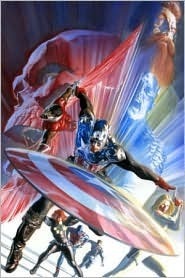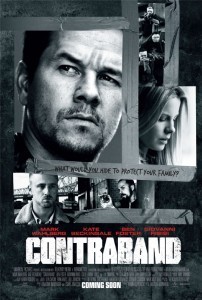Maurice Broaddus's Blog, page 40
January 24, 2012
Captain America: Road to Reborn – A Review
Art by: (various)
Published by: Marvel Comics
The problem with Road to Reborn is that it is what it is: filler. It's strictly a bridge between the Death of Captain America and his inevitable and unsurprising Reborn. Which isn't to say that there isn't a lot of good in this collection, after all, Ed Brubaker is the writer: he has not only made Captain America a relevant title, but a must read. So being the stories between major arcs (the Reborn mini-series being pulled out of the regular comic's run and given its own spotlight), this trade collects issues #49-50 and 600-601 (due to Marvel deciding to go back to their original numbering system rather than continuing with their rebooted series numbering. Strictly coincidentally, that meant that Marvel got to do two back-to-back anniversary issues).
What the renumbering of Marvel's titles hoped to do was create jump on points for new readers. Going back to the original numbering made more sense because one gets a greater feel for the sheer about of continuity in the characters. One example would be Bucky Barnes/Winter Soldier/Captain America. We have Bucky Barnes, the original Captain America's one time side kick during World War II, who was used by the Soviet's as an assassin (Winter Soldier), who eventually would become the new Captain America. With Road to Reborn, Brubaker checks in on Bucky with a look at the character through the theme of missed birthdays.
There is also a look at Captain America during his World War II days as well as a clarification of Sharon Osborn's relation to Cap's World War II girlfriend Peggy (changed from sister to niece). In issue 600, we see a celebration of Captain America on the anniversary of his death, a celebration co-opted by Norman Osborn. It ends with Sharon telling Cap's friends—the Falcon, Hawkeye, Luke Cage, Black Widow, et al, none of whom were in costume—that there was still a way to save Cap.
"There are just so many pieces of me missing these days…" –Sharon
At the heart of the Road to Reborn story is Sharon Carter: a former agent of S.H.I.E.L.D., on again/off again girlfriend of Steve Rogers/Captain America, and the woman responsible for his death (used as his assassin). She is "trapped in memories" and looking for a way to redeem herself as well as ameliorate her guilt. She is stuck in her regrets, the emotional core of the collection which almost gets lost.
It's easy to get mired in guilt and shame. Sadly, we don't always have the luxury of making things up to folks. Fixing matters isn't always an option: what's done is done. Sometimes you just have to carry the weight of your bad decisions and selfishness and hopefully let them shape you into a better person. Even our mistakes have value, if it leads to a transformation of who you are and what you do.
"We do what we can. We try to make things better in our own way. That's all anyone can do." –Josh
Some people become stuck and need help to not suffer needlessly for the wrong reasons. A counterfeit spirit and the Holy Spirit operate in similar ways. The counterfeit spirit, our enemy, feeds us lies about ourselves, focuses on what's wrong us, and heaps shame and condemnation on our heads. We feel we must hide our dark core from everyone either from fear of being rejected or not wanting to drag anyone else down. And we become mired in our own self-loathing. The Holy Spirit wants us to dine on truth. That we're an image bearer of God, a beautiful creation. Yes, we're sinners, but there's conviction, repentance, and redemption from that. And freedom.
"In his place was born a new being, less a man than an ideal. An inspirational symbol of the glory that is America." –Steve Rogers
Road to Reborn is the quiet before the storm, strictly there to set up the action of the Reborn story. And while it feels like every bit the pause that it is, there are still some great moments in it (including some art by Gene Colan, a pivotal artist/creator in Captain America's history). So while Brubaker does a good job with what he could, no storyline is advanced in particular and you can skip this and move on to Reborn without having missed much.
January 23, 2012
World-building: The Politics of Race by Kody Boye
I recently read a blog post on the issue of racism in/of D&D and it got me to thinking about issues of race in fantasy world building. Kody Boye recently released his dark fantasy Blood from his Brotherhood Saga series and touches on the issue of the politics of race. It's a topic I am interested in and plan on coming back and exploring further later.
World-building: The Politics of Race
by Kody Boye
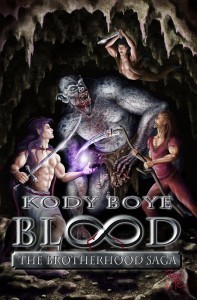 To say that we've experienced major conflict in our world would be an understatement. From enslavement of blacks by plantation owners in America, the attempted genocide of the Jewish people, to even the complete and utter annihilation of the Aztecs, there has never been a shortage of crimes against humanity. It was for this reason that, when returning to The Brotherhood Saga, I wanted to create some diversity and conflict between not only the different types of people, but the individual sentient races in my world.
To say that we've experienced major conflict in our world would be an understatement. From enslavement of blacks by plantation owners in America, the attempted genocide of the Jewish people, to even the complete and utter annihilation of the Aztecs, there has never been a shortage of crimes against humanity. It was for this reason that, when returning to The Brotherhood Saga, I wanted to create some diversity and conflict between not only the different types of people, but the individual sentient races in my world.
The majority of the Brotherhood Saga takes place in and around a series of countries called The Three Kingdoms (otherwise known as the Seaside Kingdoms.) To the west is Ornala, which is prominently made up of general 'white' and olive-skinned peoples, while to the northeast is a kingdom called Kegdulan, which features a prominent white population. Smack-dab in the middle of the two is Germa—a stark, desert wasteland where the Kadarian (black-skinned) people live. While there is much conflict between Ornala and Germa due to the amount of territory each owns (Germa believes the Ornalan king to be greedy for not sharing his land,) there is also racial conflict of area and position between other higher races—most specifically, Dwarves and Elves.
For example:
The Elves arrived on the mainland when humanity was just evolving. Over the millennia, they were exiled from the Three Kingdoms to a forest to the far south called the Abroen. Told never to return to return to the mainland under the stipulation that the territory inside the forest would belong to them, Elves have lived solitary lives within their wooded communities, but this is due to low population numbers, which ultimately keep them from overpopulating their forest.
The Dwarves, on the other hand, were present in the Kegdulanian region prior to Elves' appearance on the mainland and humanity's uprising. Settling primarily within the Hornblaris Mountain chain (which is considered to be their true home,) necessity for territory forced them to spread out into the Kegdulan. As humanity rose to dominance on the continent of Minonivna, however, and their ignorance became apparent, the very greedy Dwarves abandoned the few cities they'd created and retreated back to the mountains.
It is apparent by history within the world I have created for The Brotherhood that many races have had conflicts. Humans exiled the Leatherskin peoples (Orcs, Ogres, Goblins and Trolls) across a land bridge, which later was destroyed and cut off from the island by a massive earthquake; Elves drove the Unclean (a race of rat people) to extinction. Dwarves cannot coexist peacefully with a race of semi-sentient creatures called Hornblarin Angels. In basing these struggles around what we have learned from history, I believe I have created a much greater and widespread world that, to me, seems realistic. I can only help my readers will believe the same.
January 20, 2012
And Others in Cemetery Dance!
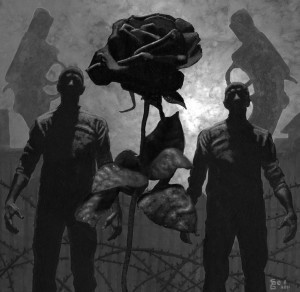 When I was in my last year of college, I took an independent writing class supervised Professor Casebeer. It was a random pairing between student and faculty, but as it turned out, he had done extensive work documenting the work of Stephen King and Clive Barker. Needless to say, it was a match made in heaven. When we were discussing where I should start sending my stories, he mentioned a then fledgling magazine called Cemetery Dance.
When I was in my last year of college, I took an independent writing class supervised Professor Casebeer. It was a random pairing between student and faculty, but as it turned out, he had done extensive work documenting the work of Stephen King and Clive Barker. Needless to say, it was a match made in heaven. When we were discussing where I should start sending my stories, he mentioned a then fledgling magazine called Cemetery Dance.
I began picking up the magazine regularly. When I read Jack Ketchum's "The Box", I vowed that one day I would be in this magazine. In fact, I made a list of magazines that I would be in one day as a sign to myself that I had made it as a writer: Cemetery Dance, Weird Tales, and Magazine of Science Fiction and Fantasy. In 2006, my story "Family Business" was published in Weird Tales. Today I'm holding my contributor's copies of Cemetery Dance. It has an interview with me (as a "New Voice"!) and a story ("Rainfall"). That story is a personal favorite of mine (and the amazing Steve Gilberts did the accompanying story art). It's about a brother who tries to prevent a bad thing from happening to his baby sister and how powerless we are in the face of tragedies to our loved ones.
Here's the rundown on the issue (the Graham Masterton Special Issue):
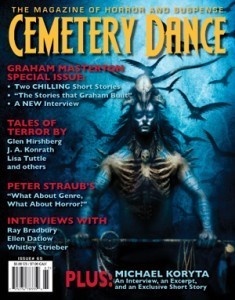 Fiction
Fiction
"Anka" by Graham Masterton
"Saint BrÓnach's Shrift" by Graham Masterton
"An Excerpt from The Cypress House" by Michael Koryta
"Winter Takes All" by Michael Koryta
"Rainfall" by Maurice Broaddus <== THAT'S ME!
"After-words" by Glen Hirshberg
"Dear Diary" by J. A. Konrath
"Manskin, Womanskin" by Lisa Tuttle
"The Book of the Dead" by David Bell
"The Town Suicide" by S. Craig Renfroe, Jr.
Features
"An Interview with Graham Masterton" by J. A. Konrath
"The Stories that Graham Built" by Matt Williams
"Feature Review : Des cendant by Graham Masterton" by W. D. Gagliani
"A Few Words with Michael Koryta" by Brian James Freeman
"New Voices : Maurice Broaddus" by Steve Vernon <== THAT'S ME, TOO!
"What About Genre, What About Horror" by Peter Straub
"An Interview with Ray Bradbury" by Jonathan R. Eller
"An Interview with Ellen Datlow" by Danica Davidson
"An Interview with Whitley Strieber" by Thomas F. Monteleone
The Usual Suspects
"Words from the Editor" by Richard Chizmar
"Stephen King News : From the Dead Zone" by Bev Vincent
"The Mothers and Fathers Italian Association" by Thomas F. Monteleone
"MediaDrome" by Michael Marano
"Horror Drive-In" by Mark Sieber
"The Last 10 Books I've Read" by Ellen Datlow
"Spotlight on Publishing" by Robert Morrish
"Fine Points" by Ed Gorman <==THAT'S ED GORMAN. HE'S NOT ME. BUT HE LIKED MY STORY! *ED GORMAN*!!!
"Cemetery Dance Reviews"
"The Final Question" by Brian James Freeman
I'm going to try and stop geeking out now. All of this happy dancing is freaking my kids out.
*P.S.*
Magazine of Science Fiction and Fantasy … I'm coming for you.
January 19, 2012
My Identity in Food
The Men's Prayer Group of our church, The Crossing, meets at our house on Wednesday nights. We've been going through a book called Who I am in Christ by Neil T. Anderson. The other thing you need to know about our group is that it's filled with a bunch of foodies, so as we're prone to do, we do a themed food night every time we hit a milestone in the book. We declare it a milestone every 3-4 weeks. For this week, I was in charge of picking the theme. Since we have reached the last chapter in the book, I thought we should do "your identity in food."
Each person was to bring a dish tied in one way or another to their identity then explain the connection to the group. Among the dishes brought were clam chowder, grilled cheese sandwiches, pork tenderloin sandwiches, fried chicken, and ice cream sandwiches. (For the record, at no point have we ever claimed that food night was especially healthy nor easy on the stomach. In fact, I'm thinking of deep fried food night in particular, food night typically ends in a bout of gluttony leaving many of us napping on the couches.)
I made BBQ chicken wings.* I thought about making a Jamaican or a British dish as they spoke directly to my cultural identity, but the wings meant more to me.
My dad was not one quick to say "I love you" when we were growing up. Nor was he an especially huggy person. That's just not how his generation did things. But he would make chicken wings. Our Sunday dinners, no matter how poor we were, were spectacles. We'd usually have a couple different meats, assorted side dishes, and something either from Jamaica or England. Not all of these culinary adventures would be a success, but my dad always made chicken wings and would set them in front of me for me to get first dibs on them. No matter what we had, or failed at making, he's have chicken wings for me because he knew I loved them.
I always took that as him saying that he thought about me and loved me. In fact, the BIG display of love would be if we finished our plates and were out of food but were still hungry. He'd give me the wings from his plate. I wouldn't eat the tips of the wings, however. As we hated to let food go to waste, my father would always take the stack of wing tips and eat them for me. To this day, I still don't eat the tips of chicken wings and I set them aside as if waiting for my dad to come collect them. It's like a ritual of love and remembrance.
Now, I have no problems saying "I love you" to my sons or showering them with embarrassing kisses. But how I share food with them has become important to me even if they never notice. They always eat first. And if they finish their food and are still hungry, they get the food from my plate. That's just another way of showing and saying "I love you" in our family.
Though I'm glad my dad has gotten better about just saying the words now. You can never hear that too often from your father.
*I'd post a picture of them, but I'm pretty sure I under-cooked them. It wasn't until I called my dad to get the recipe that I realized I never made them before for myself despite them being one of my favorite dishes.
January 18, 2012
Keeping Hope Alive
Maurice woke up from yet another night of nightmares, his pillow once again soaked with sweat as he waited for the images to fade into dim memory. Checking the time, it was only 7:40 a.m. and once again, there were no messages for him. So once again, he laid in bed and let the feeling of helplessness and rejection wash over him. He liked to give it full reign for about a half hour before he pulled together the will to once again face another day.
With something approximating optimism, he got dressed. He couldn't muster the energy to go through the complete ritual of shaving and showering, because in his heart when he believed no one wanted him, he didn't bother. But he had his plan and he planned on working it. Searching for a job meant treating the act itself like a job. So he otherwise prepared himself, went through the rest of his getting-ready-for-work ritual and prepared to face his day.
Most days it was hard enough pulling himself out of bed rather than giving into the depression which always threatened to suck him into its waiting embrace. The family's anxiety level rose, conflating with his own. The thing about anxiety was the toxic cloud it created, leaking into the fabric of everyday life like a creeping entropy. So each morning begins by answering the questions "what's the point?" and "where is the hope?"
I lost my job in December of 2009. I've done odd jobs here and there from freelance writing to substitute teaching, but I haven't had anything steady in over two years. Prolonged unemployment can do strange things to your sense of self-worth. You start listening to all of the voices that run around in the back of your head about how no one wants you or you're not good for anything. After a while you have to come up with good reasons to even get up because you begin to lose hope. Hope is one of those ephemeral things, intertwined with faith and just as fragile. Some days it flares like the sun and others I have to turn off all the lights so that I can catch a glimpse of the embers. So each day I get to remind myself of all of the reasons I have to keep getting up:
-A beautiful wife who even after eleven years loves me better than I do myself.
-Two knucklehead boys who seem to have their own R&D department committed to finding new ways to get into mischief, who also depend on me.
-Some of the best friends a man could ask for.
-Good health.
-And a continued sense of hope.
Sometimes the dark circumstances are the exact times that God uses to transform us. We feel that God is not at work, that He has abandoned us, and it is the belief that all of our cries are going unanswered that causes us the greatest pain. We need encouragement to endure this time. Look, true faith is not without hardships, nor is it all that pragmatic. So when problems arise, there are no pat answers. There are no steps. It sucks. We have to hold on and endure it. These times of crisis will either break us and cause us to abandon God or break us down and draw us nearer to Him.
A lot of times we place our love and faith in the wrong things (or good things that aren't the best things), confusing our spiritual ideas with some distorted ideas of God. Sometimes it takes a loss of control to remind us, to re-shape us. Hopefully we will figure out what's really important about our faith and walk, and be led to deeper faith.
The key is to be vulnerable, but still believe in my darkest moments of unbelief. I need to remember to go before God without pretending. Be broken, empty, terrified. Be honest with my pain, rather than put it behind me. Relief comes through honest dialogue. The more doubt expresses itself, the more it is allowed to be exposed, the easier it can be dealt with. Rather than keeping it inside, eating away at me like cancer. God is sitting shiv'ah with us during our dark nights of the soul. Grieving with us. Restoring us. In that we need to have, and can find, hope.
My hope is that God is not through with me yet and that I still have not only gifts but also a job to do. Even without full-time employment, I still have worth and can join in God's missing to reconcile people to one another and to Him. To continue to make this world a better place. The story we find ourselves in shouldn't be reduced to we sin and God forgives, but that we're children of God's, co-heirs with Jesus, called to a life of joy. We are to make His life our own, transforming us, sometimes through the refining fire of pain, to look like Him, as children come to resemble their parents. My hope is in that story. My hope is in the story of redemption available for each and every one of us. And that in recognizing our mutual need for redemption, we view one another with mercy and a measure of grace.
The story of my faith is a hope that life, with it pains and joys, laughter and tears, matters. Hope that relationships are eternal and reconciliation is possible. Hope that we are significant and matter. Hope that we are known, all of our good, all of our bad, through what we've done and for what we could be. Hope that we are loved, as we are for who we are. And all of that give me hope to get up in the morning, face another day, and dream anew of what could be.
***
Link List for January's Synchroblog // Hope
The Trouble With Hope: John Ptacek
Hope = Possibility x Imagination: Wayne Rumsby
Little Reminders: Mike Victorino
Where Is My Hope: Jonathan Brink
Hope for Hypocrites: Jeremy Myers
Now These Three Remain: Sonny Lemmons
Perplexed, But Still Hopeful: Carol Kuniholm
A Hope that Lives: Amy Mitchell
Generations Come and Generations Go: Adam Gonnerman
Demystifying Hope: Glenn Hager
God in the Dark: On Hope: Renee Ronika Klug
Keeping Hope Alive: Maurice Broaddus
Are We Afraid to Hope?: Christine Sine
On Wobbly Wheels, Split Churches and Fear: Laura Droege
Hope is Held Between Us: Ellen Haroutunian
Hope: In the Hands of the Creatively Maladjusted: Mihee Kim-Kort
Paradox, Hope and Revival: City Safari
Good Theology Saves: Reverend Robyn
Linear: Never Was, Never Will Be: Kathy Escobar
Caroline for Congress: Hope for the Future: Wendy McCaig
Fumbling the Ball on Hope: KW Leslie
January 13, 2012
Contraband – A Review
One goes into the movie with a certain amount of expectations. Everyone's working an angle, there are agendas within agendas, the plot is largely an exercise in misdirection aimed at keeping the audience guessing. You know that as soon as you hear the words "one last job" that nothing good is going to happen. Combine that with a good thriller movie which comes with its own set of expectations: revenge (typically a family in jeopardy), fighting (because luckily our star comes from a questionable background/mysterious past that come with requisite abilities), betrayal (the action movie's version of misdirection), and action cranked up to 11 to distract from any plot holes the writer may have missed. Make this a strictly no frills production and you have Contraband.
Directed by Baltasar Kormakur, Contraband is a sort of re-imagining of the 2008 thriller Reykjavik-Rotterdam which Kormakur produced and starred in. Wasting little time, we're introduced to your typical family who are trying to escape the family business: smuggling. Chris Farraday (Mark Wahlberg), a rough and tumble former smuggler so badass no one bothers to fight back (though, to be fair, he does beat up the same guy several times), is now married to Kate Farraday (Kate Beckinsale), who shouldn't even have a name but just wear a sign that reads "I'm just here to be threatened, terrorized, and rescued". Chris, together with his friend Sebastian Abney (Ben Foster), were like the "Lennon and McCartney of smuggling."
Kate's younger brother Andy (Caleb Landry Jones), who apparently shouldn't be trusted to make toast, botches a job for skuzzy (with extra-skuzzy FACIAL HAIR!) drug dealer Tim Briggs (Giovanni Ribisi). Keep in mind, this drug dealer gets his behind handed to him regularly and is completely non-threatening, just constantly resorts to threatening Kate and the kids to gain any sort of leverage on anyone. However, needing to bail out Andy is just enough of an excuse for Chris to get back into the life he missed. He pulls the old gang back together, under the nose of a suspicious captain with a history with the Farradays (J.K. Simmons), and make a run for Panama.
Smuggling is a novel backdrop for a heist movie as is the way the movie manages to work in Jackson Pollack. The handheld, shaky camera work allows the movie to negotiate the claustrophobic spaces of the ship. Eschewing anything flashy or slick—after all, this is a gritty THRILLER!—the murky cinematography adds to its cinema gritte aesthetic.
"If you get in, you have to be able to get back out." –Dad
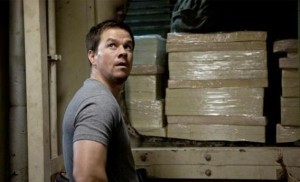 Rooting for thieves is nothing new. Wahlberg plays a blue collar, hard-nosed Robin Hood who's only wanting to protect his family. So we forgive his "doing wrong for the right reasons" credo. Despite missing his old life, he walked the straight and narrow.
Rooting for thieves is nothing new. Wahlberg plays a blue collar, hard-nosed Robin Hood who's only wanting to protect his family. So we forgive his "doing wrong for the right reasons" credo. Despite missing his old life, he walked the straight and narrow.
Plus, thieves seem to occupy a special place in God's heart, too. Jesus, when he was on the cross, suffering through the slow torturous death that was crucifixion, was also the subject of cruel taunts from the crowd, soldiers, and priests. The punishment of crucifixion was reserved for the worst of criminals, those declared enemies of the Roman state. Occupying the spot originally reserved from freed criminal Barabbas, Jesus was crucified between two other criminals. Thieves, men of violence.
Initially, both thieves joined in the crowd's scoffing, yet something changed in the (soon-to-be-contrite) thief's mind, awoke in him. To the crowds' jeers he heard Jesus say "Father, forgive them; for they do not know what they are doing." He saw his life and his own actions in a new light. On the cross, his life nearing its end, he realized that his sentence was just. He took ownership of his actions, but not only that, he saw Jesus for who He was. Just as much as Jesus identified with sinners, that sinner had a perfectly focused view of 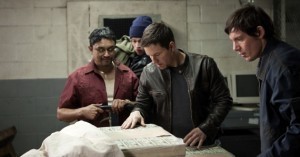 the Christ. Jesus' own disciples didn't have such a clear faith as the thief did.
the Christ. Jesus' own disciples didn't have such a clear faith as the thief did.
We love a rousing bad-boy-made-good story.
Contraband delivers exactly what you expect, almost beat for storyline beat. No more, no less as if it were cinematic action-heist comfort food. Like a sequel to The Italian Job played straight (as in without charm or humor) or [insert generic thriller – I kept waiting for a Mel Gibson-esque "Give me back my son!" sort of moment]. Which is the movie's problem: locale and smuggling backdrop aside, it is so conventional it is immediately forgettable.
January 12, 2012
Religion Sucks, Jesus is Cool, and so we go …
First up, the now viral video Why I Hate Religion, But Love Jesus
And then a comment from my friend Milo Curtis:
It seems that dumping on "religion" is in vogue right now. Which I find annoying. Instead of dumping on religion, what if we tried to recapture its intent. I think it's a miss if we ask, "Is religion good or bad?" I think the better question is, "What's the aim of your religion?" James 1:26-27 says, "If anyone considers himself religious and yet does not keep a tight rein on his tongue, he deceives himself and his religion is worthless. Religion that God our Father accepts as pure and faultless is this: to look after orphans and widows in their distress and to keep oneself from being polluted by the world."
To me, religion is nothing more than a way of organizing our thoughts, beliefs, and priorities so that we can live a life in pursuit of Jesus. If that goes astray, then it's the nature of our religion that should be challenged, not necessarily the idea of religion.
Thoughts?
And then a couple more food for thought pieces:
-Why I Don't Like the Gospel vs. Religion Distinction
-"Why I Hate Religion, But Love Jesus" – The False Dichotomy
January 11, 2012
Interviewing a New Prospective Business Manager…
 A while back, I talked about what I was looking for in a prospective agent (mind you, this was before I had either of my agents). I firmly believe that I (and probably many artists) are lousy at placing a monetary value on our work. For example, for all of our calls for professional rates, the minimum figure has remained at about five cents a word since about the days of Edgar Allan Poe.
A while back, I talked about what I was looking for in a prospective agent (mind you, this was before I had either of my agents). I firmly believe that I (and probably many artists) are lousy at placing a monetary value on our work. For example, for all of our calls for professional rates, the minimum figure has remained at about five cents a word since about the days of Edgar Allan Poe.
All that said, there are holes in my representation, so I keep my ears open when approached. In this case, I was approached by my oldest son. He made his pitch. I listened:
Me: So you're interviewing for the position of my business manager. What makes you think you'd be good for this position?
My Oldest: Well, when you bought that pen that had your book on it, you should be selling those and getting a percent of that.
Me: Wait, are you actually talking about merchandising rights?
My Oldest: Uh huh. And you need better merchandise.
Me: What sort of things would you roll out as my business manager?
My Oldest: Toys. Maurice Broaddus dolls. [Mentioning this idea to my agent, he wondered aloud what the marketability of an (in)action figure dressed in his underwear with optional Riesling accessories would be]
Me: What sort of other business opportunities could you get for me?
My Oldest: Speaking.* You need to do more book promotion. [Somewhere out there, Chesya Burke is yelling "See? I'm not the only one who's saying that!"]
Me: Any other ways you can think of to make money for me?
My Oldest: You need to get 1% of all copies of your book that you sell.
Me: I get 7%.
My Oldest: In that case, you need to get at least 10% of all copies of your book that you sell.
Me: That's my boy. You will be considered for the position.**
*I actually did put him to the test with this. I was approached to speak at a local church about writing. I was quoted a speaking fee. I took the offer to My Oldest who promptly demanded $200,000. The pastor came back with "how about a percentage of the ticket sales." I may put him in charge of all of my negotiations.
**My Youngest hates to be left out of anything. Our interview went a little differently:
 Me: Do you even know what an agent does?
Me: Do you even know what an agent does?
My Youngest: No.
Me: Do you have any connections in the publishing industry?
My Youngest: No.
Me: Are you good with people?
My Youngest: No.
Me: Can you convince them to buy my books?
My Youngest: No.
Me: What qualifications do you bring to this position?
My Youngest: I love you. And I like your books.
Me: You're not even old enough to read them.
My Youngest: So? They look good.
Me: You know, you DO sound like you'd find a perfect home in the publishing industry…
[photos by Larissa Johnson]
January 10, 2012
The Story of Revision
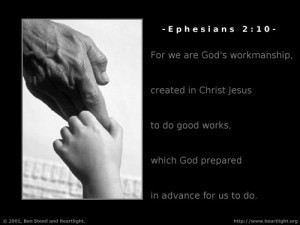 The thing about entering into a personal relationship with Christ at a young age is that you don't know what you're getting into. Seriously, it's like getting married when you're barely a teenager. You have no idea what it means to be a husband or wife or what it takes to make a marriage work. All you know is that you are now in a relationship, but you don't know what to make of it because it seems so … big.
The thing about entering into a personal relationship with Christ at a young age is that you don't know what you're getting into. Seriously, it's like getting married when you're barely a teenager. You have no idea what it means to be a husband or wife or what it takes to make a marriage work. All you know is that you are now in a relationship, but you don't know what to make of it because it seems so … big.
When we were kids, church was a part of the rhythm of our lives. I already believed in God and don't remember ever not believing in Him. My parents never went to church, but they made a habit of sending us kids. Church was just something you did. Us kids in the neighborhood even played church on the playground. I'd be the preacher and my friends would be the congregation. We might pray and paraphrase verses and otherwise imitate the shouting at church, but it was no different than a game of kickball to us. We didn't have any big goals. Life in our neighborhood was all we knew. We wanted to be rich, we wanted to get out, and we wanted to live life big.
Only a few years later, a Sunday School teacher began a friendship with me. We often hung out, reading comic books and watching horror movies and sci fi shows. One day, he took me through some verses in the Bible, explaining that we were all born sinners and that the wages of sin was death. Yet, God chose to pay the penalty for sin Himself by sending His Son, and by believing in Him, we could have eternal life. So there we were, on his couch, me in sixth grade, and we prayed a prayer. I repeated the words that he said, asking Jesus into my life and with that, I was suddenly in relationship with Christ. That simple, yet in so many ways, it was like waking up in Las Vegas, finding out that you're married, then spending a lifetime figuring out what to do next.
This is where I get stuck. A friend asked me if I were to write out my personal testimony what would the story look like. What would I share with another person if they asked? Granted, I'm not much into the "Gospel as sales pitch", but if asked, what would I say? What would the Good News of the gospel look like if you had to boil it down? Certainly there has to be more to it than a set of facts to assent to or is it that simple?
Or is the Good News that we can be in a relationship with God? Was the assent to a set of facts the equivalent to saying "I do" or had I always been in relationship with God and it was just a matter of me waking up to that fact? That can be a terrifying prospect. I'm lousy at relationships, so in a lot of ways my relationship with God looks like a constant argument. Worse in some ways because it plays out like being in an argument where the other person is always right, so it's a matter of me coming around and changing my way thinking which is always an easy thing to do.
Maybe my story is that of one of God's failed ambassadors. That God is engaged in a gentle dance with us, wooing us to Him not wanting to force Himself on us, but rather wanting us to freely choose to love Him; to join with His redemptive mission for each other and for creation. He chooses to work through a failed people for reasons we may never understand. Meeting us where we are, messy and broken. We are cracked vessels, works in progress. God doesn't give up on us … we give up on ourselves. We aren't defined by our failings and stumbling. We're defined by how we get back up, bruised knees and all, dust ourselves off, and keep on our journey.
He creates each of us by Christ Jesus to join him in the work he does, the good work he has gotten ready for us to do, work we had better be doing. –Ephesians 2:10 (The Message)
It's easy for me to get lost in my own head, to spin around and around in circles overthinking what it means to be in relationship when the story is quite simple: I am loved. So I guess if my faith is a like a story, then my walk is like the process of revision. And I am God's unfinished poem. I think that's a good place to start.
If you had to answer the question what does the Good News of the gospel mean to you, what would you say?
January 9, 2012
Those who can't…
I am part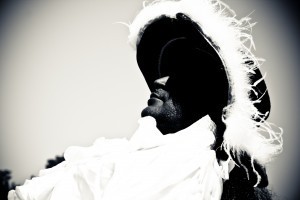 nering with the Writers Center of Indianapolis to teach a few sessions on the finer points of writing. The first one up is an introduction to speculative fiction. This will have me opining on all things horror, science fiction, and fantasy with an eye towards submitting to markets and the like.
nering with the Writers Center of Indianapolis to teach a few sessions on the finer points of writing. The first one up is an introduction to speculative fiction. This will have me opining on all things horror, science fiction, and fantasy with an eye towards submitting to markets and the like.
THE SECRETS OF THE INDUSTRY SHALL BE YOURS!!!
Or, at the very least, I may break out in a soft shoe performance, as it has always been a lifelong dream to be a tap dancer. (I may not use this pic of me as the melancholy pirate as my official author pic.)
Um, here's the official write up … make with the clicky clicky (I even have a faculty bio!)
Introduction to Speculative Fiction
Instructor: Maurice Broaddus
Saturday, January 28
9 a.m.-12 p.m.
Members $36, Nonmembers $54, Student, Teacher, Senior Members $30
Here's the thing: you know speculative fiction when you see it, even if you're unfamiliar with all of the insider jargon used to describe its many subgenres. The big three are Horror, Fantasy (high, urban, historical), and Science Fiction (hard, cyberpunk, steampunk). So if the story takes place in a far off land or an alternate version of an existing one; whether it is extrapolating science into futuristic technologies with its impact on society or conjuring new forms of magic, speculative fiction is the genre of possibility. In this course you will learn about the special needs of these genres, such as world-building, as well as skills any fiction requires, such as elements of character, plot, dialogue, setting. This is all with a view toward submission and publication, so we will explore the marketplace, discussion where and how to submit your work.
Register on-line or download a registration form.
Click here to see the Faculty Bio for Maurice Broaddus
WCI Classroom

